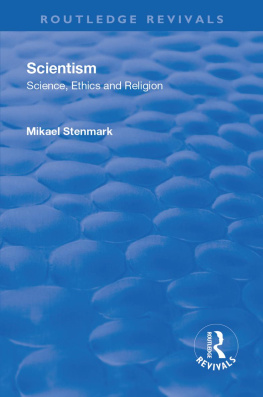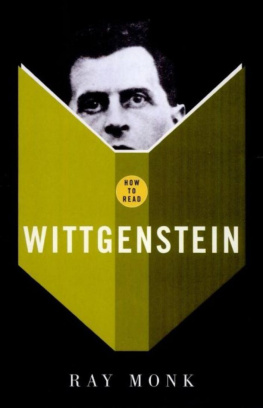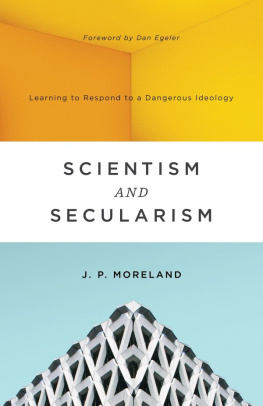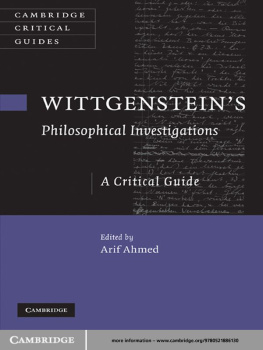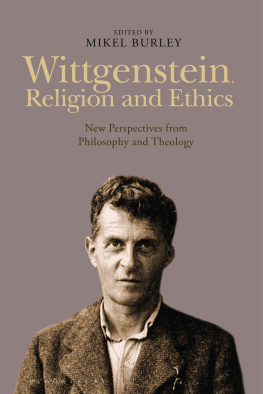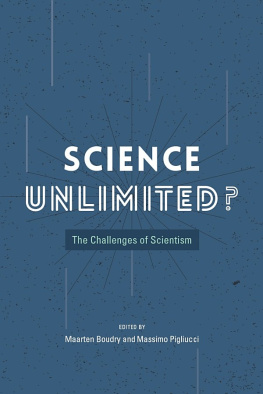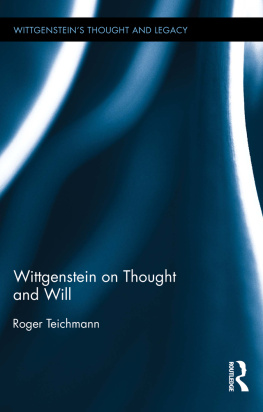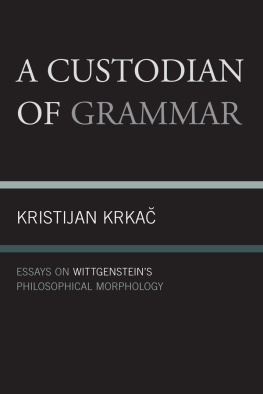Contents
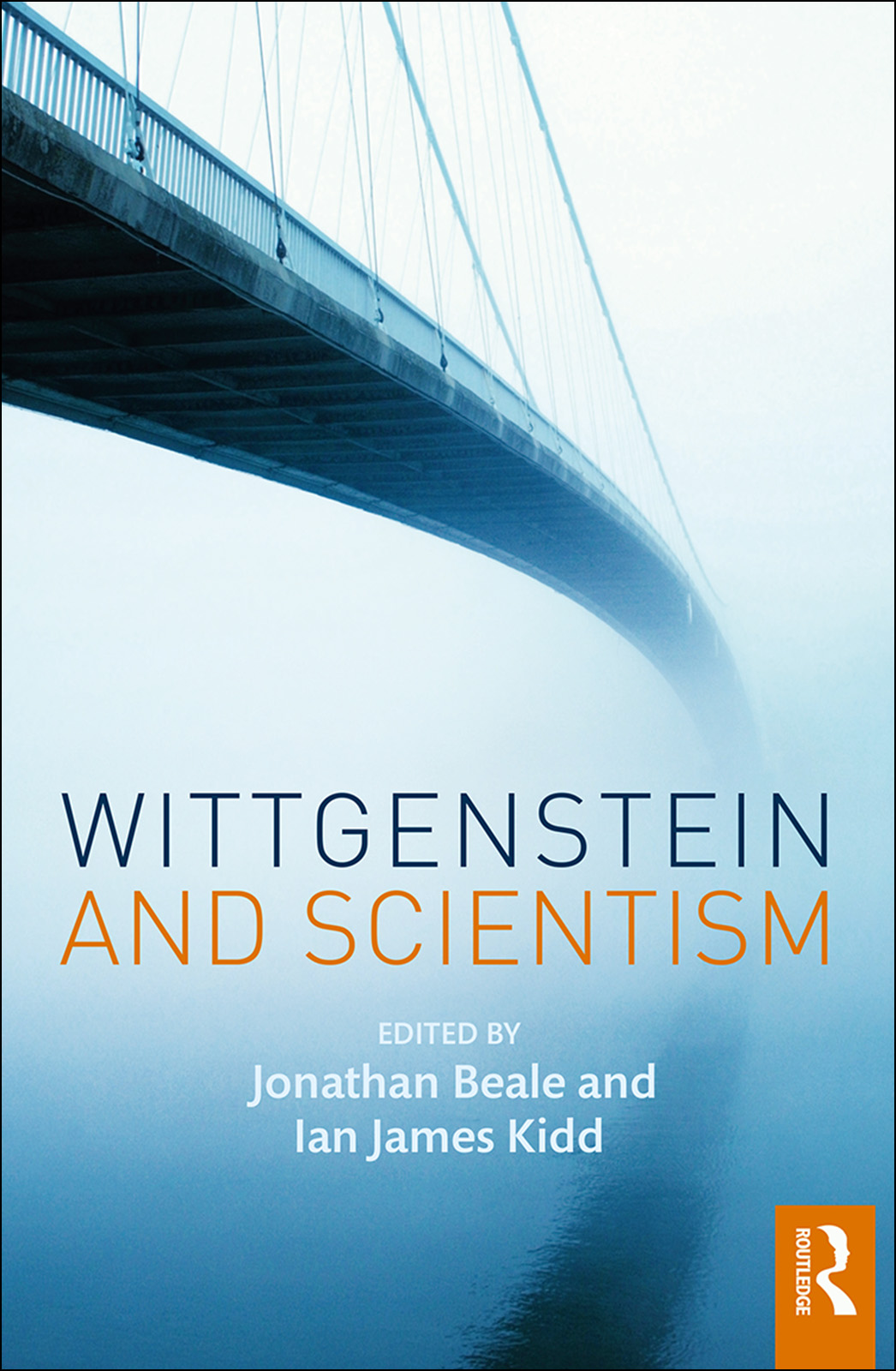
Wittgenstein and Scientism
Wittgenstein criticized prevailing attitudes toward the sciences. The target of his criticisms was scientism: what he described as the overestimation of science. This volume is the first study of Wittgensteins anti-scientism a theme in his work that is both clearly central to his thought yet strikingly neglected by the existing literature.
This volume explores the philosophical basis of Wittgensteins anti-scientism; how this anti-scientism helps us understand Wittgensteins philosophical aims; and how this underlies his later conception of philosophy and the kind of philosophy he attacked.
An international team of contributors explore and articulate Wittgensteins views on scientism and anti-scientism, critically assess them and consider how they apply to topics such as the philosophy of mind and psychology, philosophical practice, the nature of religious belief and the place of science in modern culture.
Contributors: Jonathan Beale, William Child, Annalisa Coliva, David E. Cooper, Ian James Kidd, James C. Klagge, Danile Moyal-Sharrock, Rupert Read, Genia Schnbaumsfeld, Severin Schroeder, Benedict Smith and Chon Tejedor.
Jonathan Beale is a Teacher of Philosophy in the department of Classics, Philosophy and Theology at Queen Annes School, Caversham, UK.
Ian James Kidd is Associate Professor in the Department of Philosophy at the University of Nottingham, UK.
First published 2017
By Routledge
2 Park Square, Milton Park, Abingdon, Oxon, OX14 4RN
and by Routledge
711 Third Avenue, New York City, NY 10017
Routledge is an imprint of the Taylor & Francis Group, an informa business
2017 selection and editorial matter, Jonathan Beale and Ian James Kidd; individual chapters, the contributors
The right of Jonathan Beale and Ian James Kidd to be identified as the authors of the editorial material, and of the authors for their individual chapters, has been asserted in accordance with sections 77 and 78 of the Copyright, Designs and Patents Act 1988.
All rights reserved. No part of this book may be reprinted or reproduced or utilised in any form or by any electronic, mechanical, or other means, now known or hereafter invented, including photocopying and recording, or in any information storage or retrieval system, without permission in writing from the publishers.
Trademark notice: Product or corporate names may be trademarks or registered trademarks, and are used only for identification and explanation without intent to infringe.
British Library Cataloguing-in-Publication Data
A catalogue record for this book is available from the British Library
Library of Congress Cataloging-in-Publication Data
A catalog record for this book has been requested
ISBN: 978-1-138-82939-8 (hbk)
ISBN: 978-1-315-27619-9 (ebk)
Typeset in Sabon
by codeMantra
Die Wissenschaft: Bereicherung & Verarmung. Die eine Methode drngt alle andern beiseite. Mit dieser verglichen scheinen sie alle rmlich, hchstens Vorstufen. Du mut zu den Quellen niedersteigen um sie alle nebeneinander zu sehen, die vernachlssigten & die bevorzugten.
Science: enrichment & impoverishment. The one method elbows all others aside. Compared with this they all seem paltry, preliminary stages at best. You must climb down to the sources to see them all side by side, the disregarded & the preferred.
Ludwig Wittgenstein, Culture and Value
Jonathan Beale is a Teacher of Philosophy at Queen Annes School, Caversham. He wrote a PhD thesis on Wittgensteins views on scientism at the University of Reading and has published articles on Wittgenstein in journals including Ratio. He has lectured at the University of Reading and from 20112013 he was a Fellow in Philosophy at Harvard University.
William Child is a Professor of Philosophy at the University of Oxford and Fellow of University College, Oxford. He is the author of Wittgenstein (2011) and Causality, Interpretation and the Mind (1994) and co-editor, with David Charles, of Wittgensteinian Themes: Essays in Honour of David Pears (2001). He has published widely on Wittgenstein and on the philosophy of mind.
Annalisa Coliva is Professor of Philosophy at University of California, Irvine and Associate Professor at the University of Emilia. Her research focuses on epistemology, philosophy of mind and on the history of analytic philosophy, especially Moore and Wittgenstein on scepticism, relativism and self-knowledge.
David E. Cooper is Professor of Philosophy Emeritus at Durham University, having previously taught at Oxford, Miami, London and Surrey universities. His books include The Measure of Things: Humanism, Humility and Mystery (2002), Meaning (2003), A Philosophy of Gardens (2006), and Convergence with Nature: A Daoist Perspective (2012). His current research interests are in the areas of animal ethics, phenomenology of religion, aesthetics and environmental philosophy.
Ian James Kidd is an Assistant Professor of Philosophy at the University of Nottingham and formerly worked at Durham and Leeds. His research interests include the philosophy of science, scientism and anti-scientism, and the philosophy of Paul Feyerabend. He has published widely on all of these, including Reappraising Feyerabend (2016, co-edited with Matthew Brown). His webpage is https://sites.google.com/site/dfl2ijk/.
James C. Klagge is Professor of Philosophy at Virginia Tech, where he has taught since 1985. He has co-edited two collections of material from Wittgenstein: Philosophical Occasions (1993) and Public and Private Occasions (2003), and authored two books on Wittgenstein: Wittgenstein in Exile (2011) and Simply Wittgenstein (2016). He is currently working on two further book projects, Tractatus in Context and Wittgensteins Artillery.
Danile Moyal-Sharrock is Reader in Philosophy at the University of Hertfordshire. Her research and publications focus on what she calls the third Wittgenstein. She is the author of Understanding Wittgensteins On Certainty (2007) and The Third Wittgenstein (2004), and several edited volumes. She is also President of the British Wittgenstein Society.
Rupert Read is Reader in Philosophy at the University of East Anglia. He has written and edited a number of books on Wittgenstein. His interest in environmental ethics has included critiques of scientism and the Precautionary Principle. He is also chair of the UK-based think tank, Green House, and a former Green Party of England and Wales councillor, spokesperson, European parliamentary candidate and national parliamentary candidate.
Genia Schnbaumsfeld is Professor of Philosophy at the University of Southampton who specialises in epistemology, Wittgenstein, Kierkegaard and the philosophy of religion. She is the author of The Illusion of Doubt (2016) and A Confusion of the Spheres Kierkegaard and Wittgenstein on Philosophy and Religion (2007). Online versions of some of her papers and articles can be found at https://soton.academia.edu/GeniaSchnbaumsfeld.
Severin Schroeder is Associate Professor in Philosophy at the University of Reading. He has written three monographs on Wittgenstein: Wittgenstein: The Way Out of the Fly Bottle


